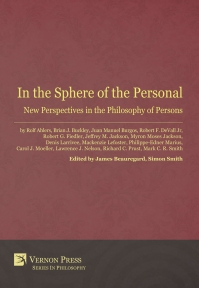Persons and Values in Pragmatic Phenomenology
Explorations in Moral Metaphysics
by J. Edward Hackett (Savannah State University)
Purchase this book
(click here to change currency)
Here is a book in which philosophy is done while introducing the reader into the under-investigated philosophy of Max Scheler (1874-1928). Edward Hackett proves the relevance of Scheler’s work on persons and values for moral philosophy, connecting it with that of William James (1842-1910). He clarifies the necessity of combining phenomenology and pragmatics against the background of the works of Heidegger, Husserl, and other relevant thinkers. The author argues that pragmatism and phenomenology are to be combined into a ‘participatory realism’, which can answer metaphysical questions that persist in (meta-)ethics from the days of G.E. Moore until now. Hackett thus creates – convincingly – a discourse that moves beyond the continental-analytic divide, to capture issues concerning values and persons in both traditions. As the persistence of this divide is halting progress in philosophy, 'Persons and Values in Pragmatic Phenomenology' is groundbreaking. It makes analytical-ethical concerns comprehensible to continental-minded readers and vice versa. Its philosophical analysis of the James–Scheler connection was also much-needed. Persons and Values invites for more work to be done on the central issue of religion in (moral) philosophy. Its characterization of ‘spiritual feelings’ as disembodied and the corresponding interpretation of the Catholicism that influenced Scheler should be further discussed. Also, the focus on ‘moral metaphysics’ in Hackett’s study has the effect that the sociological, cultural and historical analyses in Scheler’s philosophy of values are neglected. But this only makes further research into this compelling philosopher’s work more urgent.
Angela Roothaan, Vrije Universiteit Amsterdam, Netherlands
This book brings together the author’s overall research trajectory of the last five years of his life and the questions he has been asking himself: What is the person? And, what are values? In answering the latter question, Hackett arrived at an answer within the boundaries of Max Scheler, the German phenomenologist, but consequently started to explore the depths of which Scheler’s value ontology was predicated on certain assumptions about the person. From these questions, Hackett started to draw upon philosophical approaches that thematize experience—pragmatism and phenomenology.
Rooted in the philosophical contributions of Scheler and the American philosopher, William James, this book guides the reader through a fascinating exploration of these philosophical approaches in relation to the person and values. Through thematizing experience, this book reveals that the ontology of value for Scheler resides not only in a person’s intentionality but also in the being-of-an-act. As such, this book argues that the deficit of an ontology of value in Scheler rests on interpreting his affective intentionality in much the same way that Heidegger employed phenomenology to discern the ontological care structure of Dasein. In other words, for Scheler, the ontology of value rests on the manner in which values were realized by a person’s intentionality. Moreover, this book goes further to reveal that the intentional act life is the source of participation and can be understood as a process-based account of value, otherwise known as account participatory realism. Importantly, within participatory realism Hackett addresses how values have their origin in the process of intentionality since intentionality is generative of meaning.
As an important contribution to the field of moral metaphysics, Hackett’s critical reflection on the person and values provides a stimulating insight into some of the key debates surrounding pragmatism and phenomenology that will be of great interest to both experienced scholars and researchers, alike.
Acknowledgements
Introduction
by Kenneth W. Stikkers
Preface
Chapter 1 Heidegger’s Neglect of Value: Schelerian Prospects
Chapter 2 The Lived-Experience of Humanism in Husserl and James
Chapter 3 Participatory Realism in Scheler’s Ethics
Chapter 4 Interpreting Scheler’s Aktsein through Heidegger’s Sein-in-der-Welt
Chapter 5 Phenomenological Personalism
Chapter 6 Persons Realizing Values: How Participatory Realism Works
Chapter 7 Embodying Values: Making Values More Concrete
Chapter 8 Finding Hierarchy and Phenomenological Realism in James’s Affective Intentionality
Chapter 9 Ethical Non-naturalism and Schelerian Participatory Realism
Bibliography
Endnotes
Index
J. Edward Hackett is a Lecturer at Savannah State University in Savannah, Georgia. Specializing in ethical theory, phenomenology, and American philosophy he is the co-editor of the anthology Phenomenology for the Twenty-First Century and edited House of Cards and Philosophy with Wiley Blackwell. Recently, he edited a special issue of William James Studies on the connection between phenomenology and pragmatism. Moreover, he’s been developing the connection between James, Scheler, and phenomenology with publications in such journals as Contemporary Pragmatism, Comparative and Continental Philosophy, Phenomenology and Mind, Appraisal, William James Studies, Journal of Applied Hermeneutics, and Forum Philosophicum. In addition, Hackett’s current research includes Zen-Catholicism dialogue, personalism, and Martin Luther King, Jr., applied ethical issues, and pluralism in democracies. He graduated with his PhD from Southern Illinois University in 2013, and he has been married to Ashley since July 30, 2006.
Max Scheler, William James, Martin Heidegger, Pragmatic Phenomenology, Participatory Realism, Phenomenological Ethics, Befindlichkeit, Attunement, Being-in-the-World, Aktsein
Subjects
Philosophy
Series
Philosophy of Personalism
Related services
Find in a library near you Download HQ cover Find in Bookshop.orgSee also
Bibliographic Information
Book Title
Persons and Values in Pragmatic Phenomenology
Book Subtitle
Explorations in Moral Metaphysics
ISBN
978-1-62273-485-6
Edition
1st
Number of pages
250
Physical size
236mmx160mm

![Persons and Values in Pragmatic Phenomenology [Paperback]](/file/6607/509b92d5562b724bcff3063fcae07ea6/1537435871.jpg)





